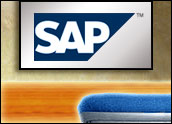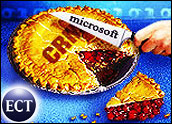
Along with its preliminary financial results for the fourth quarter, SAP gave the markets notice that its hosted-CRM application will be available in February. CEO Henning Kagermann made the revelation during an analyst briefing on Wednesday morning.
As with previous quarters, SAP’s earnings reflect the company’s ongoing momentum. Its software revenues increased 18 percent compared to the same period in 2004, exceeding the company’s software revenue guidance by 12 percent to 14 percent.
This year, it predicts a rise in software license sales of between 15 percent and 17 percent.
Driving SAP’s projected increase will be increased investments. The company plans to spend heavily on new initiatives such as Mendocino, as well as on its analytics applications, its midmarket product line, premium maintenance, and, of course, the expected hosted CRM.
SAP’s CRM business line is already on a strong growth trajectory. Figures released on Wednesday showed its CRM revenues grew by 20 percent in 2005, over 2004.
The company also announced that its Safe Passage Program, first rolled out to U.S. companies in October 2005, will be extended to other countries this year. Safe Passage is aimed at companies running Siebel software that are uncertain whether to switch to Oracle as a vendor now that Siebel has been acquired.
Mid-Market Push
Siebel’s customer base, for the most part, is at the enterprise end of the market where SAP is a very strong player.
In 2006, SAP plans to further accelerate its efforts to gain greater share in the mid-market by bolstering development, marketing and sales for its All-in-One product.
The much awaited on-demand CRM application will be part of SAP’s mid-market play.
Another Player
Though they were in the dark about exactly when SAP’s on-demand product would appear, CRM vendors have had several months to position themselves for its expected entry into the market — which it now appears could be as early as next week.
Vendors such as Siebel OnDemand, Salesforce.com and Salesnet are expected to be the most affected, though they may not be too worried. After all, the market anticipated that Salesforce.com and other hosted-CRM providers would feel the heat when Siebel rolled out its OnDemand application, but there is little to suggest that actually happened.
SAP may be entering too late to have much of an impact. “SAP is missing the boat by doing only CRM as an on-demand solution,” NetSuite CEO Zach Nelson told CRM Buyer. “They will be about the hundredth player to announce the solution, and they will be leaving the fastest growing segment of the on-demand market — the ERP market — to NetSuite.”
SAP, for its part, is largely keeping its own council. It likely wants to be able to go head to head with Oracle on all fronts, including the hosted market. Also, it cannot ignore the growth rates seen in the hosted space over the last few years. Application hosting, for example, will grow by 22 percent per year through 2009 — faster than other revenue categories — AMR Research predicts.
Another One in the Wings
It is unlikely the hosted-CRM market has matured to the extent that it cannot afford to support another vendor, even one of SAP’s heft. Other companies are still queuing up to jump on the bandwagon, notably FrontRange, which also intends to release a hosted-CRM product this year.
FrontRange is planning to enter the market very aggressively in the second half of 2006, Vice President Kevin Smith told CRM Buyer, with a multi-tenant based product priced under US$100 per seat.
There is a great deal of unclaimed market share in the hosted-CRM space, Smith asserted, especially for a lower-priced product. “Some of the applications available now go for as much as $200 per seat, and that is without the additional options they offer.”
SAP has not provided pricing or additional product details about its hosted-CRM application.
Its entrance in the market in February, Smith thinks, is unlikely to have an immediate impact on the market for many reasons. “The SAP application model is very large, very heavy and very complex. It is not naturally suited to a hosted solution, and they will have to prove that they can do this well,” he said.
Eventually, though, SAP will have an impact on the market, Smith acknowledged, assuming the product is up to customer expectations.























































